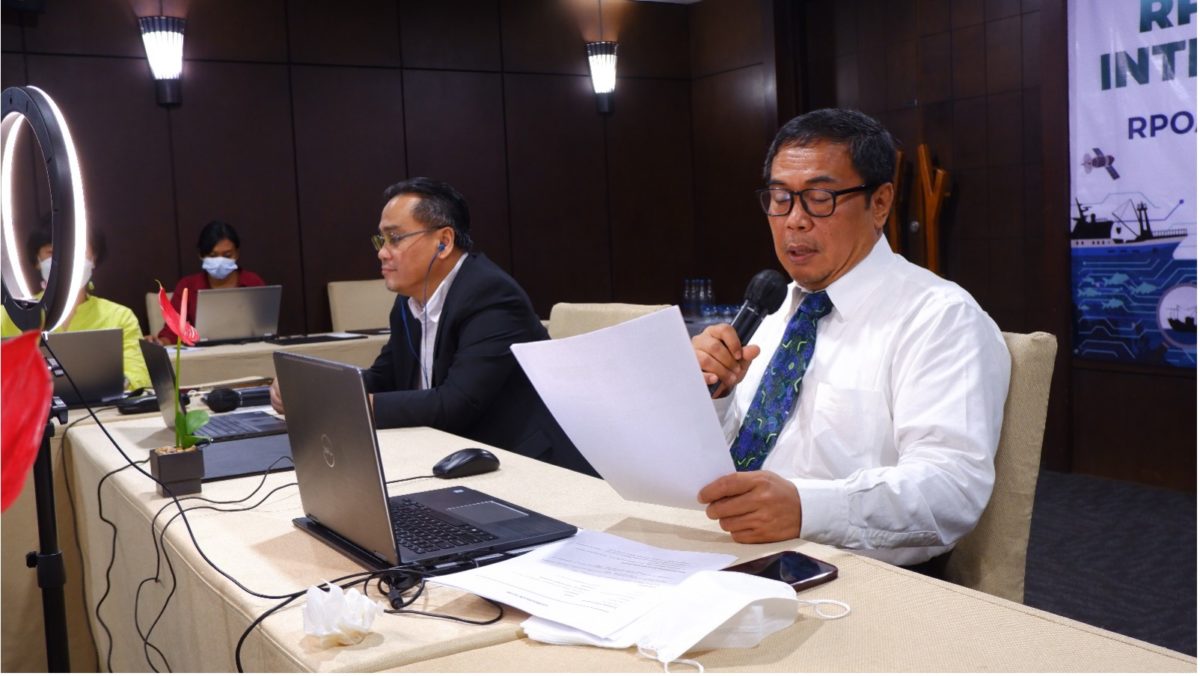The Director General of Surveillance for Marine and Fisheries Resources, Ministry of Marine Affairs and Fisheries of the Republic of Indonesia (Ditjen PSDKP) has openly submitted a proposal to establish an intelligence network in the fisheries sector of the ASEAN region, as well as the Arafura and Timor Seas (ATS). The establishment of this intelligence network aims to increase deterrence and law enforcement for the purpose of combatting illegal fishing in the region.
“The initiation of the establishment of the Fisheries Intelligence network through the RPOA-IUU will strengthen efforts to combat IUU Fishing in Southeast Asia,” said the Director General of PSDKP, Rear Admiral TNI Adin Nurawaluddin, through a keynote speech during the recent RPOA-IUU Fisheries Intelligence Training, held on 8 April 2022.
Fisheries intelligence has proven to be a very effective way to prevent and combat illegal fishing practices worldwide. This is evidenced by the Canadian Department of Fisheries and Maritime Affairs (DFOC), which has established the National Fisheries Intelligence Services (NFIS) and the Australian Fisheries Management Authority (AFMA), which has its own intelligence unit.
“These international countries already have their own intelligence units and are developing international networks in the field of fisheries intelligence,” noted the Director General. Responding to the trend of establishing an international intelligence network in the field of fisheries, the Regional Plan of Action to Combat Illegal, Unreported, and Unregulated Fishing (RPOA-IUU), a regional institution consisting of ASEAN countries plus Australia, Timor-Leste and Papua New Guinea, carried out the RPOA-IUU Fisheries Intelligence Training activities on 5-8 April 2022.

New Guinea, carried out the RPOA-IUU Fisheries Intelligence Training activities on 5-8 April 2022.
“Intelligence in the field of fisheries is an approach that must be taken to combat illegal fishing, which has a very complex modus operandi,” said Adin.
New Guinea, carried out the RPOA-IUU Fisheries Intelligence Training activities on 5-8 April 2022.
“Intelligence in the field of fisheries is an approach that must be taken to combat illegal fishing, which has a very complex modus operandi,” said Adin.

Furthermore, Adin said that Indonesia had actually carried out surveillance activities that applied the principle of intelligence through the implementation of the integrated surveillance system (ISS).
“Based on the data and information obtained from the results of the analysis of VMS, AIS and Radar, and equipped with the results of airborne surveillance and community information, we have effectively succeeded in carrying out an ambush using a fishing surveillance vessel,” confirmed Adin in his statement. He also noted that intelligence activities in the fishery sector will complement the effectiveness of the monitoring, control and surveillance (MCS) system.
“Intelligence in the field of fisheries will further increase the effectiveness of supervision and law enforcement against illegal fishing. This is evidenced in the arrest of illegal fishing vessels MV. Viking and MV. Nika,” concluded Adin.
Meanwhile, ATSEA-2 Regional Project Manager, Dr. Handoko Adi Susanto, conveyed his readiness to support the initiation of the establishment of a fisheries intelligence network in the ASEAN and ATS regions.

“This fisheries intelligence training for RPOA-IUU and ATS member countries is the first step and the ATSEA-2 Project is ready to support the next steps,” said Handoko.
Furthermore, Handoko explained that the RPOA-IUU Fisheries Intelligence Training activity was organised by the Directorate General of PSDKP KKP as the RPOA-IUU Secretariat in collaboration with the ATSEA-2 Project and supported by the UNDP, GEF and PEMSEA.
The training, which was attended by 43 participants from 10 countries, presented speakers from Canada’s National Fisheries Intelligence Services (NFIS), the United States National Oceanic and Atmospheric Administration (NOAA), the University of Indonesia’s Centre for Sustainable Ocean Policy (CSOP) and the Indonesian Ocean Justice Initiative (IOJI). Participants came from Australia, Indonesia, Timor-Leste, Papua New Guinea, the Philippines, Thailand, Malaysia, Singapore and Vietnam.
Previously, Indonesian Minister of Marine Affairs and Fisheries, Sakti Wahyu Trenggono had commanded that the surveillance of marine and fishery resources be continuously strengthened, including through international cooperation – both regionally and bilaterally. This step is intended to strengthen efforts to prevent and combat illegal fishing, in order to achieve the implementation of the blue economy principle, which makes ecology commander in chief in the management of marine and fishery resources.
This article was published on the MMAF Website.


